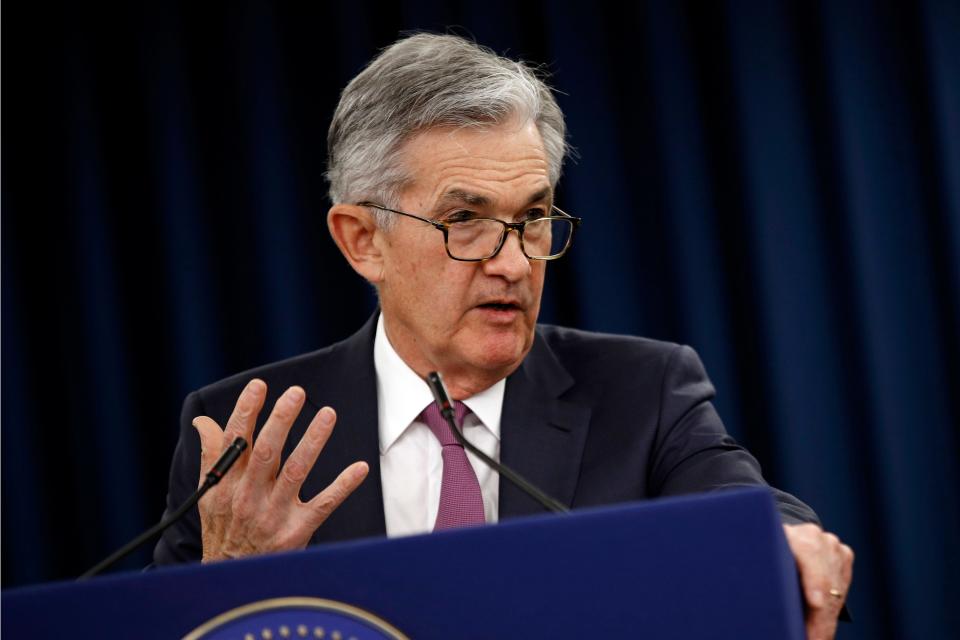Powell says Fed is poised to raise interest rates for first time in three years to fight inflation despite Ukraine war, market sell-off
Despite Russia’s invasion of Ukraine and a sliding stock market, Federal Reserve Chair Jerome Powell will tell Congress Wednesday the central bank plans to raise its key interest rate from near zero this month to fight a historic surge in inflation.
“With inflation well above 2% and a strong labor market, we expect it will be appropriate to raise the target range for the federal funds rate at our meeting later this month,” Powell said in prepared testimony he was scheduled to deliver to the House financial services committee at 10 a.m.
Powell’s remarks confirm wide expectations of the Fed’s first rate hike in more than three years after he told reporters in late January that officials were “of a mind” to lift the benchmark short-term rate, assuming conditions are appropriate for us to do so.“
Since then, the Ukraine war has driven oil and gasoline prices higher, further clogged the nation’s supply chains and intensified a stock market sell-off.
But Powell said in his written testimony, “The near-term effects on the U.S. economy of the invasion of Ukraine, the ongoing war, the sanctions, and of events to come, remain highly uncertain…We will need to be nimble and responding to incoming data and the evolving outlook.”
So far this year, Powell said, the economy has been solid, with “robust” job gains in January that lowered unemployment to 4%.
““The rapid spread of the omicron variant led to some slowing in economic activity early this year, but with cases having declined sharply since mid-January, the slowdown seems to have been brief,” Powell said.
Meanwhile, the Fed’s preferred annual inflation measure reached 6.1% in January while a more widely publicized reading, the consumer price index, was at 7.5%, highest in 40 years.
Powell said the Fed expects the price surges to ebb as supply chain bottlenecks ease, household demand moderates as consumers deplete their stimulus checks and other government aid from last year, and the Fed raises interest rates.
“But we are attentive to the risks of potential further upward pressure on inflation expectations and inflation itself from a number of factors,” Powell said in the prepared text.
“We know that the best thing we can do to support a strong labor market is to promote a long expansion, and that is only possible in an environment of price stability,” he added.
The war is likely to worsen inflation but could also slow the economy through higher pump prices and falling stocks. That poses a dilemma for Fed policymakers as they weigh how sharply to raise rates this month and the rest of the year.
The Fed boosts rates to discourage borrowing, temper an overheated economy and head off spikes of inflation. It lowers them to spur borrowing, economic activity and job growth.
How high will rates go?: What’s next for interest rates? Fed chair may offer clues on inflation curbs as Ukraine war escalates
Powell provided no clues on the course of rate increases in his written remarks but lawmakers will likely press him for more details. Some Fed officials have said they favor a half-point hike at a March 15-16 meeting to show their resolve to fight soaring prices. But top economists have said a quarter-point move became more likely after the war threatened to hinder growth.
Powell also plans to tell lawmakers the Fed will begin shrinking its bloated balance sheet “after the process of raising interest rates has begun, and will proceed in a predictable manner primarily through adjustments to reinvestments.”
Since March 2020, the Fed has purchased $4.5 trillion in Treasury bonds and mortgage-backed securities, initially to stabilize the financial system and then to lower long-term rates for consumers and businesses.
The Fed has said it will gradually trim the holdings by not reinvesting the proceeds from some of the assets as they mature rather than selling the bonds outright, which could disrupt markets. The sales are likely to push up long-term rates, such as for mortgages.
Some economists expect the central bank to begin paring down the balance sheet in June or July.

This article originally appeared on USA TODAY: Jerome Powell testimony: Fed set to raise rates despite Ukraine war



